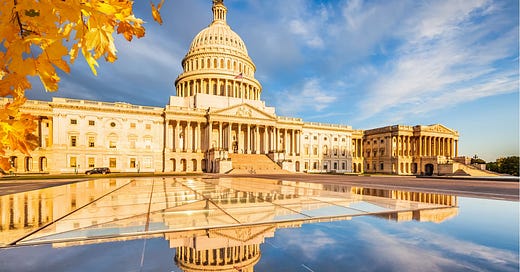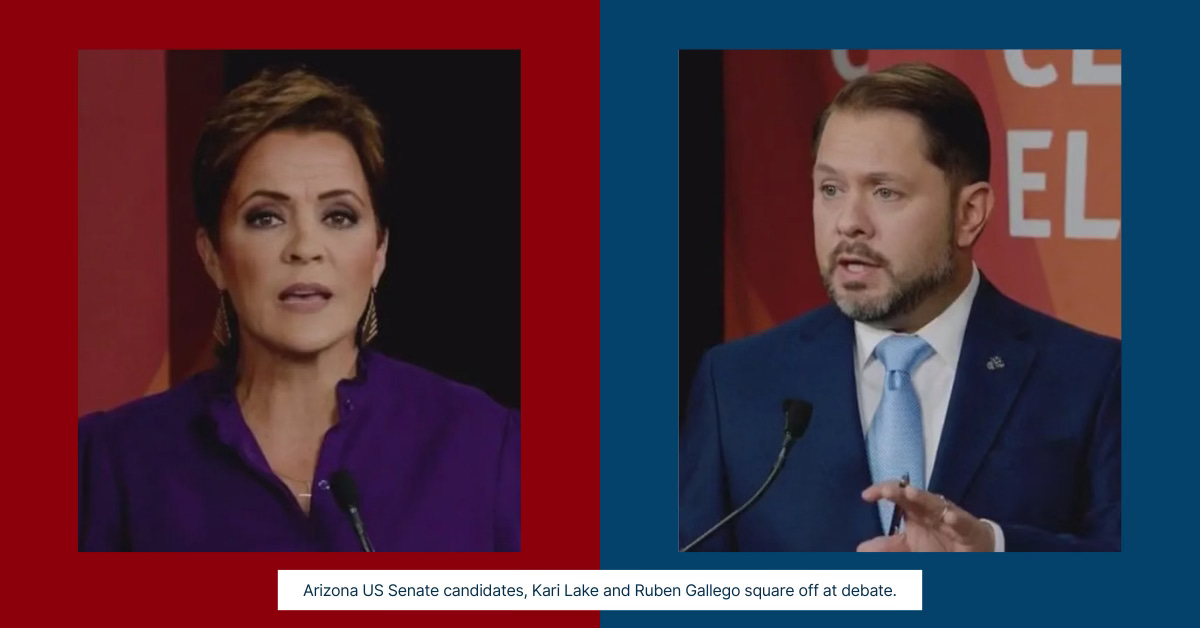Voting for Equality: US Senate Races
What you need to know about Senate races in Arizona and around the country
In the next two weeks we will be releasing our Voting for Equality Newsletter series. These newsletters will focus on key elements of the 2024 election that will have an impact on the state of LGBTQ equality in Arizona and the nation. We hope these newsletters will help you be a more informed voter as you fill out your ballot at home or go to the polls.
Control of the Senate in 2024
The 2024 election will be a pivotal moment in American politics, with both the presidency and control of the Senate hanging in the balance. The outcome of a handful of key Senate races across the country will determine which party holds the majority, shaping the legislative landscape for years to come.
Currently, Democrats hold a slim 51-49 majority in the Senate, including three Independents who caucus with them. With 34 Senate seats up for grabs in November, Republicans are aiming to flip control of the chamber. Democrats face a challenge in defending their majority, with a loss anticipated in West Virginia due to the retirement of Senator Joe Manchin. Republicans are focusing on capitalizing on this opportunity, targeting several Democratic-held seats in states that lean Republican or are considered toss-ups.
Several factors will contribute to the intense competition for Senate control. These include:
National political climate: The overall political climate, including the presidential race between Donald Trump and Kamala Harris, will heavily influence down-ballot races.
State demographics and voting patterns: The political makeup of each state, along with historical voting trends, will play a significant role. States like Montana, which Trump won by a substantial margin in 2020, pose challenges for Democratic incumbents.
Candidate quality and campaigns: The strength of individual candidates, their campaigns, and their ability to connect with voters will be crucial. Fundraising, messaging, and strategic decisions will all impact the outcome.
Key issues: Issues such as inflation, immigration, abortion, and healthcare are likely to dominate the campaigns, with candidates attempting to appeal to voters' concerns and priorities.
Senate Races to Watch around the Country
At least seven Democratic-held seats are competitive this fall, including in presidential battleground states.
Montana is a key race to watch. Senator Jon Tester (D-MT) is trailing his Republican challenger, Tim Sheehy, in the polls. Montana has become solidly Republican in national politics. Former president Donald Trump won Montana with 57% of the vote in 2020, and he is currently leading Vice President Kamala Harris in the state by 17 points.
The poll also shows Republican Ted Cruz leading Democratic challenger Colin Allred by 4 points in Texas and Republican Rick Scott leading Democrat Debbie Mucarsel-Powell by 9 points in Florida.
However, Republican Senate candidates are running behind Trump in many races. In Texas, Trump leads Harris by seven points, while Cruz leads Allred by four. In Florida, Trump leads Harris by 13 points, while Senator Rick Scott (R-FL) leads Representative Debbie Mucarsel-Powell (D-FL) by nine. In Montana, Trump's lead is 10 points larger than Sheehy's.
An independent candidate, Dan Osborn, is running against Republican incumbent Deb Fischer in Nebraska. If Osborn wins and does not caucus with either party, it could affect which party controls the Senate. However, similar independent efforts in Kansas in 2014 and Utah in 2022 ended with Republican victories.
The Arizona Senate Race
The Arizona Senate race stands out as a particularly significant and closely watched contest. Incumbent Senator Kyrsten Sinema, an Independent who caucuses with Democrats, is retiring, creating an open seat that both parties are vying to capture. The race pits Democrat Ruben Gallego against Republican Kari Lake, each representing distinct approaches and priorities. The outcome of this race could tip the balance of power in the Senate, making Arizona a focal point of national attention.
Here's a closer look at the key aspects of the Arizona Senate race.
The Candidates:
Ruben Gallego: A five-term Democratic congressman, Gallego brings experience and a pragmatic approach to the race. He has highlighted his Harvard education and combat experience in Iraq, positioning himself as a seasoned leader. Gallego has criticized Lake for her stance on abortion and her continued claims of election fraud.
Kari Lake: A former newscaster and the Republican nominee, Lake is a polarizing figure known for her embrace of Trump's election denialism. Following her unsuccessful gubernatorial bid in 2022, Lake has attempted to shift her focus to issues like inflation and immigration in her Senate campaign. She has portrayed Gallego as a radical leftist, aiming to capitalize on concerns about the Democratic party's direction.
Polling and Projections:
Gallego's lead: Gallego consistently holds a lead in the polls, with FiveThirtyEight reporting an average of 50% support for Gallego and 42% for Lake in polls conducted between October 8th and 14th. Gallego has led in 54 out of 57 polls since March 2024. The New York Times, working with Siena College, found Gallego ahead by 7 points among likely voters.
Lake's performance: While Lake has attempted and failed to moderate her image, she continues to face challenges, including skepticism from some moderate Republicans and independents.
Cook Political Report rating: The Cook Political Report rates the Arizona race as "lean Democratic." Inside Elections also moved its rating to "lean Democratic" from its previous "tilt Democratic" rating. Sabato’s Crystal Ball rates it as "leans Democratic".
Arizona Candidates and LGBTQ Issues
The Arizona Senate race features starkly contrasting positions on LGBTQ issues. The sources highlight the candidates' views and actions related to LGBTQ rights, providing insight into their potential impact on policy should they win the election.
Ruben Gallego has a strong record of supporting LGBTQ rights. He has consistently supported policies promoting equality, including co-sponsoring the Equality Act. The Equality Act aims to amend existing civil rights law to explicitly include sexual orientation and gender identity as protected characteristics, prohibiting discrimination based on these factors in areas like employment, housing, and public accommodations. Additionally, Gallego has advocated for transgender rights by opposing bans on gender-affirming care and supporting transgender individuals' right to serve in the military. His voting record reflects this commitment, including his vote in favor of the Respect for Marriage Act, which codifies federal protections for same-sex and interracial marriages.
Gallego's dedication to LGBTQ equality is further demonstrated by his actions within his home state of Arizona. In 2014, while serving in the Arizona State House, he led opposition against an expansion of Arizona's Religious Freedom Restoration Act.Critics argued that this expansion could have been used to justify discrimination against LGBTQ individuals under the guise of religious freedom. His commitment to LGBTQ rights has earned him a perfect score on the Human Rights Campaign's Congressional Scorecard, which evaluates members of Congress based on their support for LGBTQ equality.
Beyond legislative action, Gallego has been a vocal advocate for LGBTQ individuals. He spoke out against the "Don't Ask, Don't Tell" policy during his time in the Marines and led efforts against Proposition 107, a same-sex marriage ban in Arizona. He has also worked to ensure that LGBTQ veterans who were discharged due to their sexual orientation or gender identity receive their earned VA benefits.
Kari Lake, on the other hand, has expressed views and taken actions considered hostile towards the LGBTQ community.She has made disparaging remarks about the LGBTQ community, stating that her gay friends are "appalled" by the additions to the acronym "LGBTQ+" and using terms like "alphabet mafia". This rhetoric suggests a dismissive attitude towards the diverse identities within the LGBTQ community. Lake has criticized schools that teach students about gender identity, characterizing such education as promoting "confusion" and using terms like "lunatic" and "crazy" to describe these topics.This stance aligns with efforts to restrict discussions of LGBTQ issues in educational settings.
Lake has made inflammatory and unsubstantiated accusations about the LGBTQ community. For example, she has tweeted that a child's gender is determined by God at conception and implied that schools are responsible for creating transgender youth. This assertion misrepresents the understanding of gender identity and perpetuates harmful stereotypes about transgender individuals. She has also accused President Joe Biden of promoting "grooming" by linking school lunch program funds to the adoption of LGBTQ-inclusive policies. This accusation baselessly associates LGBTQ individuals with child abuse and is considered a dangerous form of rhetoric.
Lake's association with individuals and groups known for anti-LGBTQ views raises further concerns. She initially endorsed Jarrin Jackson, a candidate for the Oklahoma state Senate who has espoused anti-Semitic, anti-immigrant, and anti-LGBTQ views.Though she later rescinded this endorsement due to public backlash, it initially signaled an alignment with extreme ideologies.
Individuals who know Lake personally have challenged her anti-LGBTQ stance, claiming it is a political maneuver. Richard Stevens, a drag performer name Barbara Seville, has stated that Lake is "friends with drag queens" and has even participated in drag herself. These accounts suggest a discrepancy between Lake's public image and her private interactions. Stevens’ courageous advocacy about Lake’s hypocrisy played a key role in discrediting Lake’s 2022 gubernatorial bid.
The Arizona Senate race is shaping up to be a pivotal contest with national implications. The candidates' contrasting backgrounds, policy positions, and approaches to campaigning make it a compelling race to watch. With control of the Senate at stake, the outcome in Arizona could have a significant impact on the future of American politics. While Gallego has a consistent record of supporting LGBTQ rights through both his words and actions, Lake's positions and rhetoric demonstrate hostility towards the LGBTQ community. This stark contrast highlights the significance of the Arizona Senate race for LGBTQ rights and equality.
Help Equality Arizona Get Out the Vote for 2024
We need you to join us this Saturday to get out the vote in Arizona. Join us as we canvass with the incredible Equality Utah team! We are thrilled to have our friends from Equality Utah coming down to canvass in Arizona so let’s turn out as Equality Arizona to add to the effort to turn out Arizona voters. Every Arizona vote will count in this election - so every door knocked will matter!









